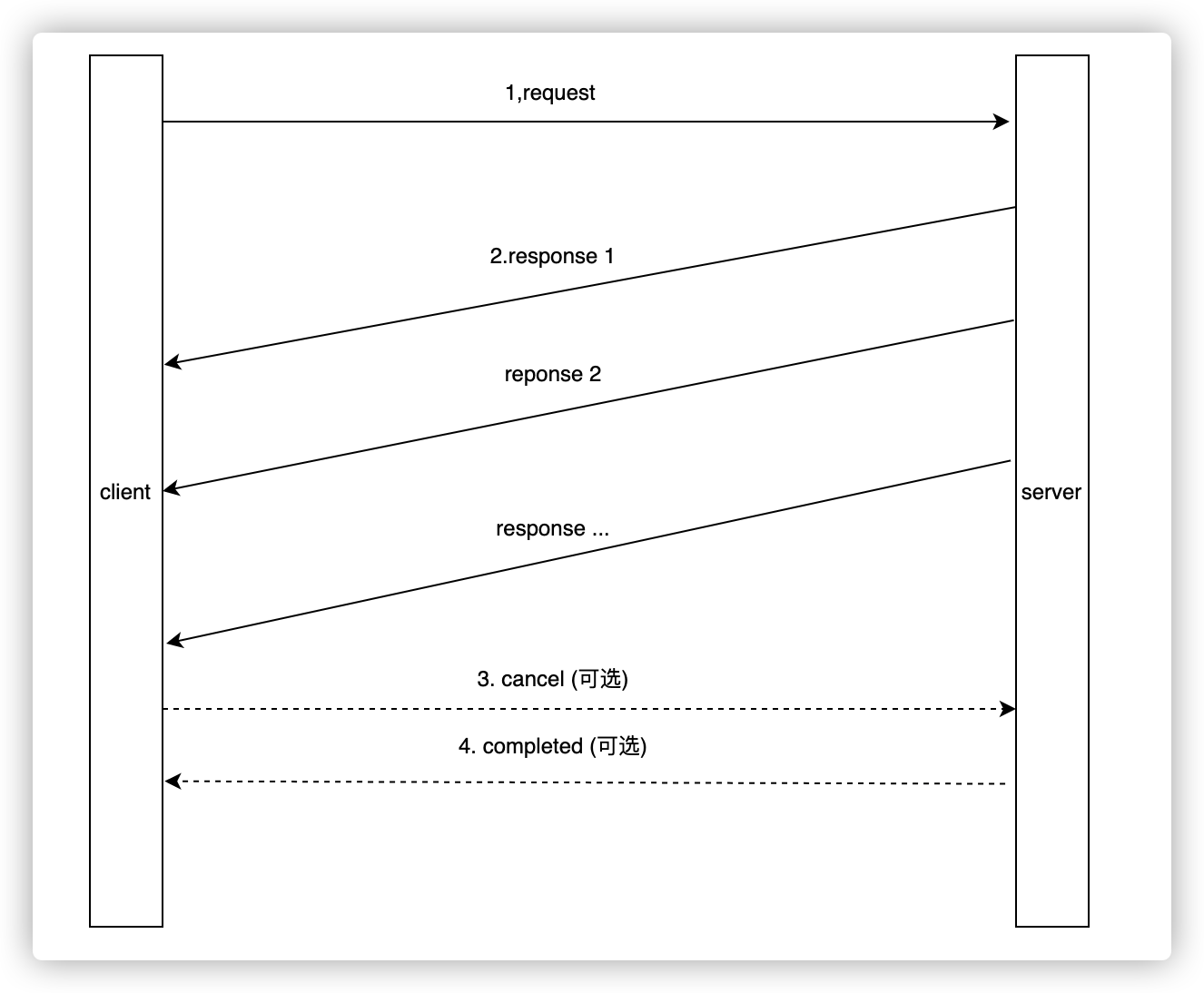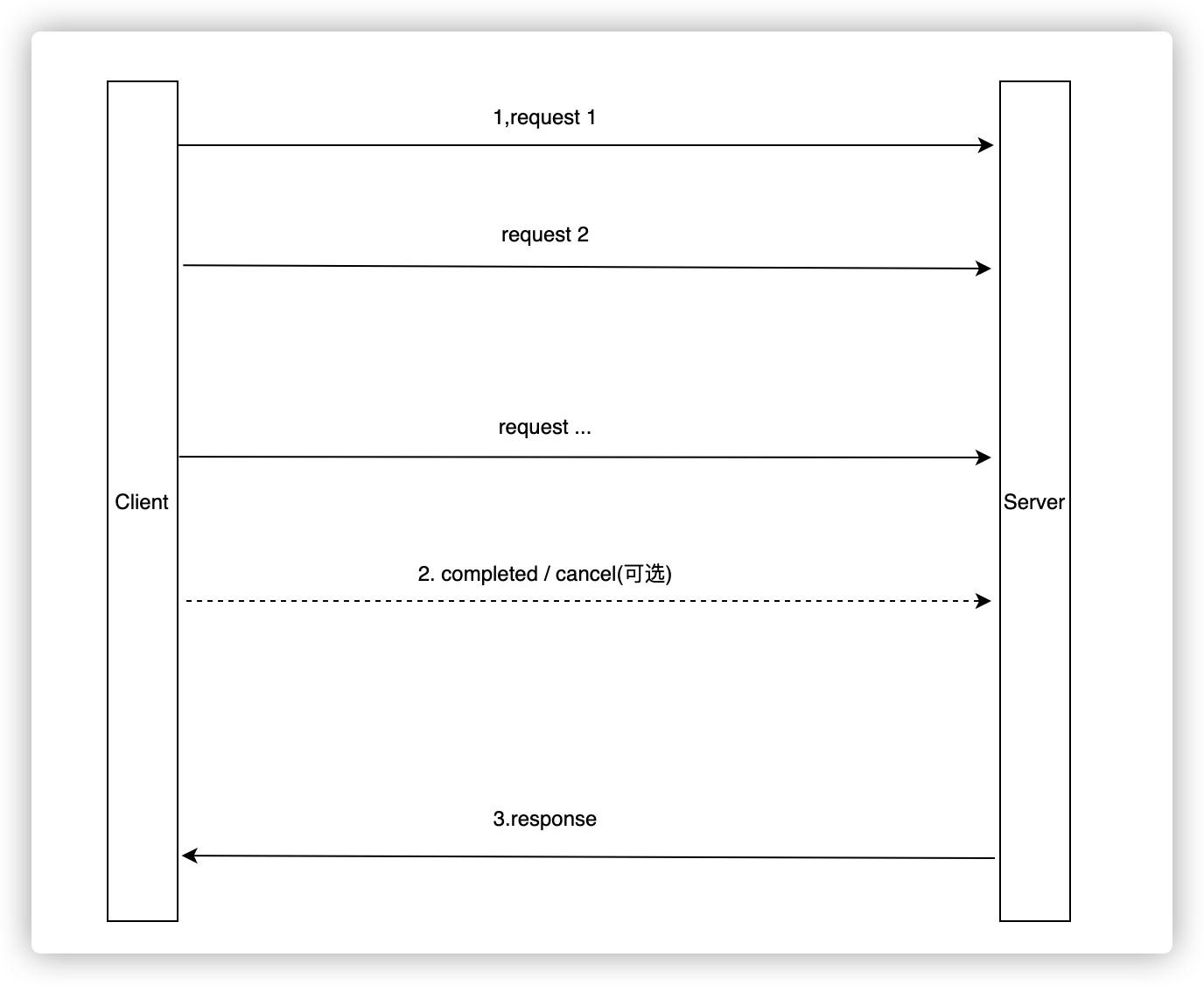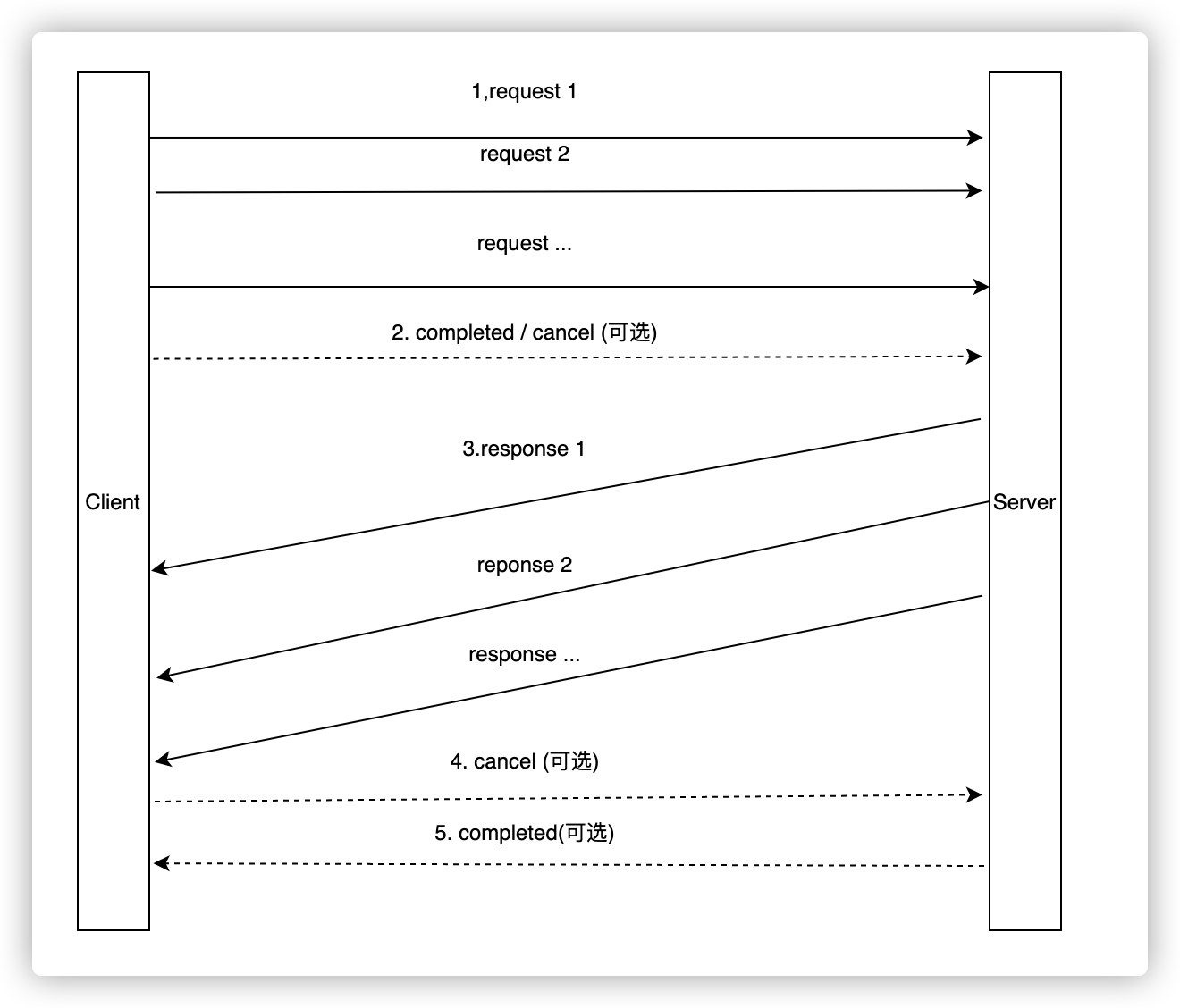Streaming communication mode
For specific use cases, please refer to: [dubbo-samples-triple/pojo](https://github.com/apache/dubbo-samples/tree/master/3-extensions/protocol/dubbo-samples-triple/src/main/java /org/apache/dubbo/sample/tri/pojo);
Open the new feature of Triple - Stream (stream)
Stream is a new call type provided by Dubbo3. It is recommended to use stream in the following scenarios:
- The interface needs to send a large amount of data. These data cannot be placed in an RPC request or response, and need to be sent in batches. However, if the application layer cannot solve the order and performance problems in the traditional multiple RPC method, if the order needs to be guaranteed , it can only be sent serially
- In streaming scenarios, data needs to be processed in the order they are sent, and the data itself has no definite boundary
- In push scenarios, multiple messages are sent and processed in the context of the same call
Stream is divided into the following three types:
- SERVER_STREAM (server stream)

- CLIENT_STREAM (client stream)

- BIDIRECTIONAL_STREAM (bidirectional stream)

Due to the limitations of the
javalanguage, the implementation of BIDIRECTIONAL_STREAM and CLIENT_STREAM is the same.
In Dubbo3, the stream interface is declared and used as SteamObserver, and users can use and implement this interface to send and handle stream data, exceptions, and end.
For Dubbo2 users, they may be unfamiliar with StreamObserver, which is a stream type defined by Dubbo3. There is no Stream type in Dubbo2, so it has no impact on migration scenarios.
Stream Semantic Guarantees
- Provide message boundaries, which can easily process messages separately
- Strictly ordered, the order of the sender is consistent with the order of the receiver
- Full duplex, no need to wait for sending
- Support cancellation and timeout
Non-PB serialized stream
- api
public interface IWrapperGreeter {
StreamObserver<String> sayHelloStream(StreamObserver<String> response);
void sayHelloServerStream(String request, StreamObserver<String> response);
}
The method input parameters and return values of the Stream method are strictly agreed. In order to prevent problems caused by writing errors, the Dubbo3 framework side checks the parameters, and throws an exception if there is an error. For
BIDIRECTIONAL_STREAM, it should be noted thatStreamObserverin the parameter is the response stream, andStreamObserverin the return parameter is the request stream.
- Implementation class
public class WrapGreeterImpl implements WrapGreeter {
//...
@Override
public StreamObserver<String> sayHelloStream(StreamObserver<String> response) {
return new StreamObserver<String>() {
@Override
public void onNext(String data) {
System.out.println(data);
response.onNext("hello,"+data);
}
@Override
public void onError(Throwable throwable) {
throwable. printStackTrace();
}
@Override
public void onCompleted() {
System.out.println("onCompleted");
response.onCompleted();
}
};
}
@Override
public void sayHelloServerStream(String request, StreamObserver<String> response) {
for (int i = 0; i < 10; i++) {
response.onNext("hello," + request);
}
response.onCompleted();
}
}
- Call method
delegate.sayHelloServerStream("server stream", new StreamObserver<String>() {
@Override
public void onNext(String data) {
System.out.println(data);
}
@Override
public void onError(Throwable throwable) {
throwable. printStackTrace();
}
@Override
public void onCompleted() {
System.out.println("onCompleted");
}
});
StreamObserver<String> request = delegate.sayHelloStream(new StreamObserver<String>() {
@Override
public void onNext(String data) {
System.out.println(data);
}
@Override
public void onError(Throwable throwable) {
throwable. printStackTrace();
}
@Override
public void onCompleted() {
System.out.println("onCompleted");
}
});
for (int i = 0; i < n; i++) {
request.onNext("stream request" + i);
}
request.onCompleted();
Serialized stream using Protobuf
For the Protobuf serialization method, it is recommended to write IDL and use the compiler plugin to compile and generate. The generated code is roughly as follows:
public interface PbGreeter {
static final String JAVA_SERVICE_NAME = "org.apache.dubbo.sample.tri.PbGreeter";
static final String SERVICE_NAME = "org.apache.dubbo.sample.tri.PbGreeter";
static final boolean inited = PbGreeterDubbo.init();
//...
void greetServerStream(org.apache.dubbo.sample.tri.GreeterRequest request, org.apache.dubbo.common.stream.StreamObserver<org.apache.dubbo.sample.tri.GreeterReply> responseObserver);
org.apache.dubbo.common.stream.StreamObserver<org.apache.dubbo.sample.tri.GreeterRequest> greetStream(org.apache.dubbo.common.stream.StreamObserver<org.apache.dubbo.sample.tri.GreeterReply> responseObserver);
}
Complete use case
Writing the Java interface
import org.apache.dubbo.common.stream.StreamObserver; import org.apache.dubbo.hello.HelloReply; import org.apache.dubbo.hello.HelloRequest; public interface IGreeter { /** * <pre> * Sends greeting by stream * </pre> */ StreamObserver<HelloRequest> sayHello(StreamObserver<HelloReply> replyObserver); }Write the implementation class
public class IStreamGreeterImpl implements IStreamGreeter { @Override public StreamObserver<HelloRequest> sayHello(StreamObserver<HelloReply> replyObserver) { return new StreamObserver<HelloRequest>() { private List<HelloReply> replyList = new ArrayList<>(); @Override public void onNext(HelloRequest helloRequest) { System.out.println("onNext receive request name:" + helloRequest.getName()); replyList.add(HelloReply.newBuilder() .setMessage("receive name:" + helloRequest.getName()) .build()); } @Override public void onError(Throwable cause) { System.out.println("onError"); replyObserver.onError(cause); } @Override public void onCompleted() { System.out.println("onComplete receive request size:" + replyList.size()); for (HelloReply reply : replyList) { replyObserver.onNext(reply); } replyObserver.onCompleted(); } }; } }Create a Provider
public class StreamProvider { public static void main(String[] args) throws InterruptedException { ServiceConfig<IStreamGreeter> service = new ServiceConfig<>(); service.setInterface(IStreamGreeter.class); service.setRef(new IStreamGreeterImpl()); service.setProtocol(new ProtocolConfig(CommonConstants.TRIPLE, 50051)); service.setApplication(new ApplicationConfig("stream-provider")); service.setRegistry(new RegistryConfig("zookeeper://127.0.0.1:2181")); service. export(); System.out.println("dubbo service started"); new CountDownLatch(1). await(); } }Create Consumer
public class StreamConsumer { public static void main(String[] args) throws InterruptedException, IOException { ReferenceConfig<IStreamGreeter> ref = new ReferenceConfig<>(); ref. setInterface(IStreamGreeter. class); ref. setCheck(false); ref.setProtocol(CommonConstants.TRIPLE); ref. setLazy(true); ref. setTimeout(100000); ref. setApplication(new ApplicationConfig("stream-consumer")); ref.setRegistry(new RegistryConfig("zookeeper://mse-6e9fda00-p.zk.mse.aliyuncs.com:2181")); final IStreamGreeter iStreamGreeter = ref. get(); System.out.println("dubbo ref started"); try { StreamObserver<HelloRequest> streamObserver = iStreamGreeter.sayHello(new StreamObserver<HelloReply>() { @Override public void onNext(HelloReply reply) { System.out.println("onNext"); System.out.println(reply.getMessage()); } @Override public void onError(Throwable throwable) { System.out.println("onError:" + throwable.getMessage()); } @Override public void onCompleted() { System.out.println("onCompleted"); } }); streamObserver.onNext(HelloRequest.newBuilder() .setName("tony") .build()); streamObserver.onNext(HelloRequest.newBuilder() .setName("nick") .build()); streamObserver.onCompleted(); } catch (Throwable t) { t. printStackTrace(); } System.in.read(); } }Run Provider and Consumer, you can see that the request returns normally
onNext
receive name:tony
onNext
receive name:nick
onCompleted
common problem
- protobuf class not found
Since the bottom layer of the Triple protocol needs to rely on the protobuf protocol for transmission, even if the defined service interface does not use protobuf, it is necessary to introduce protobuf dependencies into the environment.
<dependency>
<groupId>com.google.protobuf</groupId>
<artifactId>protobuf-java</artifactId>
<version>3.19.4</version>
</dependency>